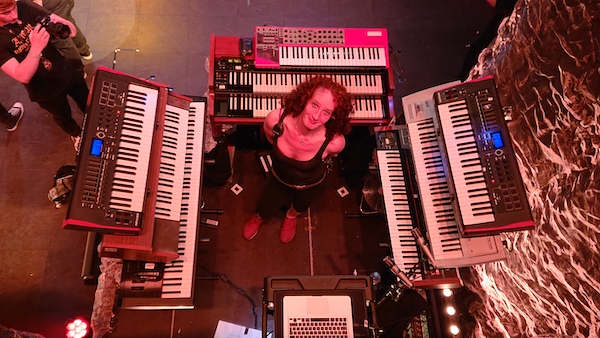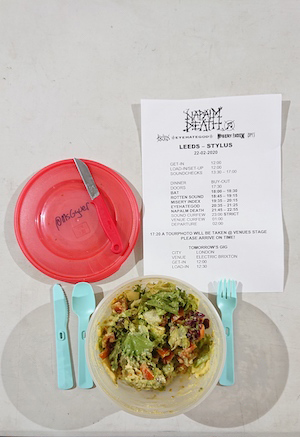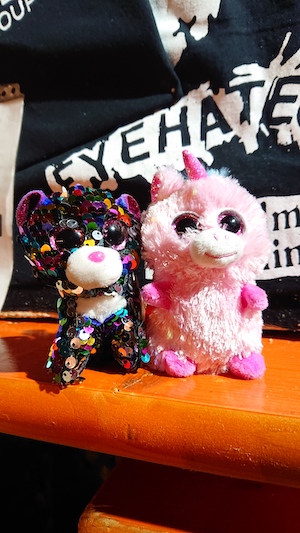Next up in our Crew Nation series is Laura Nagtegaal, a multi talented Tour Manager, Guitar & Keys Technician and Merchandise Manager.
Laura has worked in the industry for decades, working with the likes of Rival Sons, Cradle of Filth, Devin Townsend Project and festivals including Soundwave.
We caught up with Laura about her rise through the industry….
Your roles vary widely from guitar tech to tour managing and merch. Do you have a favourite role or aspect of a role and why?
Oh, that is actually a question that is harder than I expected.
Guitar & Keys Tech is what I’ve done most since starting full time touring (since 2007, often combining that with tour management). For me, that role is the perfect combination of music, technique, ‘taking care of’, and ‘being the silent force’. It’s definitely the role that most people connect me to, and I enjoy it enough, otherwise I wouldn’t continue to do that work.
I’d like to think that because I was always the sober, sensible, together and calm one on tour, I automatically gravitated towards doing Tour Manager work. I was asked to do tour managing before I even suggested I wanted to; it was a synchronicity thing.
Before touring full time, I did merch on national shows with a few Dutch bands. The last tour I did before the lockdown started was selling merch, and in many ways it was one of the most fun tours.
Why would you say it was one of the most fun tours you’ve done?
If nothing else, it was the first full length tour I’d done since my transition, and also the first tour where I didn’t give the bands a heads up about me being transgender. I was simply Laura; sunny, happy, and having a good time, and that was so liberating. And to most of the musicians, there were 5 bands in total, I was just that, Laura. I am convinced several of them still don’t know I am transgender. And that’s the way it should be.
True story; in the past, I have actually gotten left behind at airports, the band and crew not even realising I wasn’t in the van, that’s how incredibly invisible and vanilla I was.
Between 2017 and 2019, all the shows and weekend tours I did, I made sure to tell the bands up front about being transgender. In hindsight, I am on the fence about whether or not I should have, or should have had to. But I did. I think it helped break the ice and avoided awkward moments I was wary of, while I was still physically transitioning. Should I have just showed up and say “Hi, I’m Laura?” Who knows?
The one thing I notice to be attributed to me regardless of what function I perform on tour, is that I am considered to have this zen vibe (with a lot of sunshine added now that I am Laura) around me that my colleagues and the artists find very pleasant; I’ve also been called a “smiling whirlwind” recently, and that felt very empowering and confidence boosting on a personal level.
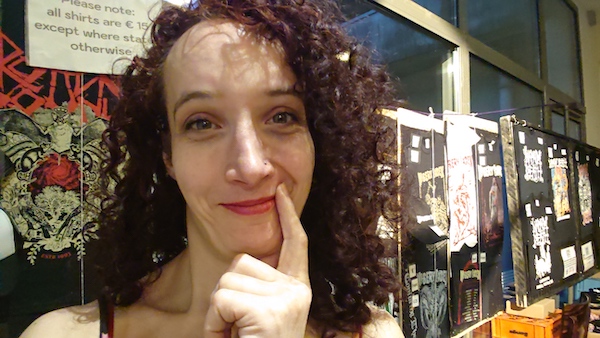
What about your favourite part of these roles?
I really wouldn’t know which job description I like best, they all have their very specific up and downsides. Doing tech work, I am closest to the fire (sometimes literally), and that has something magical; being instrumental in preventing that tiny thing slightly off from becoming a catastrophic show stopping mishap; the thumbs up and hug from that musician before or after a stressful show.
When I am wearing my tour manager uniform, I like having to juggle multiple flaming hot grapefruits without letting a single one drop.
When selling merch, what I like very much, is the contact with the fans, and the chance to get totally nerdy on the spreadsheets to keep the whole merch operation running smoothly. Plus of course being able to wear that flowery dress that would look very odd while tech-ing on stage.
You’ve worked with some really big rock bands including Within Temptation. How did you get from your first job in the industry to where you are now?
I don’t really see the difference between large or small bands; my job stays the same. The pressure is obviously going to be higher for the band, but that doesn’t affect my performance or job I believe.
At the very least, not to an extent where I notice a difference. And I think that’s the same for the band I work with.
I was interviewed for a “Road to Wacken” special, where a camera crew followed the band and crew over the period of a few months in the build up towards them headlining the biggest (80,000 cap) festival they’d play that year. I remember being incredibly matter-of-factly and underwhelmed, and that contrasted sharply with what they tried to convey. They wanted a “OMG, this is so cool, so exciting, feel the tension, wow!” special, and there I was, almost disturbingly underwhelmed.
Imagine me thinking “I don’t need to tune the guitar quite as well for just 30 people compared to when the band plays for 80,000”. I wouldn’t be surprised if that exact mindset is what caused bigger bands to ask me relatively early on. Not being star-struck, not being overwhelmed by the wow! factor that touring and big shows obviously have.
I started touring full time in January of 2003, with Samael and Cathedral. Less than 5 months after that, I worked for Within Temptation. I never quite made it to A list bands, and since 2006 I have been asked regularly if I’m available, but actual offers never came, it just never worked out. I would consider the bands I predominantly work with “the biggest small bands”, or “the smallest big bands”; playing venues between 500 and 8,000.
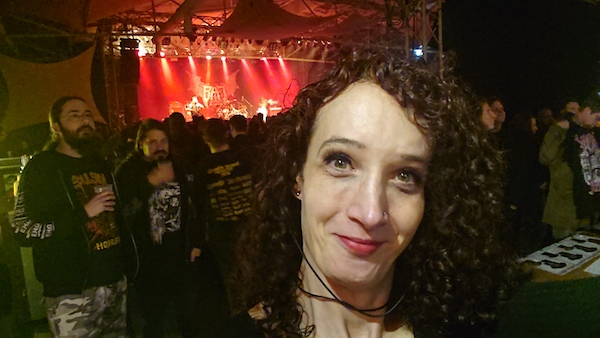
Tour life can be very busy – how do you manage your well being when out on the road?
For me, that is very much a before and after thing. I am transgender and in the summer of 2016 I learned to accept that. It was a few days prior to a 7 week tour across 3 continents (I didn’t tell the band), and a few months later, I came out to them and other bands.
Before I had learnt to accept myself, I did nothing that helped keep my well being on an acceptable level. I was literally behaving like a dependable yet apathetic robot; with a few bands, my nickname directly referred to that.
I would actually skip dinner and rest if I felt I needed to do something to help keep the artist satisfied. I would literally run on fumes for months on end, and simply carry on regardless, like the robot I pretended to be (so I would not need to come to terms with not doing what was necessary to be happy) .
For me, working hard was my perfect escape from myself. Stringing tours together with my sister actually coming to the airport to swap out my duffel bag of laundry, that is how I preferred to roll. Saying and doing “La la la, I can’t hear you” to myself screaming for attention.
And what better place to hide as a not-man, like a sheep among wolves, among ultra-men, in an environment that could easily be considered misogynist. Luckily, that last part is changing rapidly, but in the beginning of my career, that was most definitely a given.
Now, since accepting myself, I am a lot more conscious about the person behind the crew person that I am. If I am not happy, I can not make/keep my artist happy. It’s the same with love. If you don’t love yourself, you can’t love that other person.
Whether it is those five minutes extra in the bath room to make sure I look and feel as well as I want to, or the making sure I eat what is right for me, at the times it is right for me.
You were interviewed by Sound Girls about transitioning gender while working in music. In your opinion what can the industry do to reduce any stigma around transgender and promote a positive and inclusive message?
I wouldn’t really know if there is a message to send out to the industry, other than something I experienced very dramatically last year.
Until 2016, I worked, masquerading to be a man, and when talking about tour & show offers, it felt like those would typically be confirmed within minutes. Since my transition, I noticed that negotiations would typically take weeks, to then in the end be told “well, we found someone else”.
Of all the things that changed, like my name, my gender marker, my clothes, my presence in the room (from wallflower’s shadow, to being a vibrant person you want to take into account) and if you really insist, what is and isn’t in my underwear… those are really all irrelevant. The only thing you should be caring about is the only thing that matters; have my skills changed? No they have not.
But yes, as was played out widely in the media about two years ago, how about personnel in the USA military? The current political climate there clearly pushed towards “well, those people will need so much medical care, and cost so much, and bring a lot of drama, they can’t possibly be a person to depend on”. I think that to some extent, that same vibe is present in our industry. And I can understand it; our work is basically a high precision military operation, with tight deadlines, potentially lethal technical structures.
But really, if anything has changed about me as a person, I am more in tune with myself, and as such, am able to be truly passionate instead of pretending to be. My technical skills have not changed, my human skills have improved. And I would bet a fair amount on this being the same for other people who transition(ed) in this industry.
Finally, what is the one item you can’t do without on tour?
My laptop will definitely have to where I go, and that was pretty much all I really “had to have’. However I’d now put that on par with a basic but complete makeup kit, my tupperware & cutlery set to make sure I always have healthy good food wherever I am during the day, and a small fluffy unicorn.
Four equals one as well, right? If pressed, I could fit all but the laptop inside that one tupperware, so that counts as one.
Girl’s got to live and love, you know?

